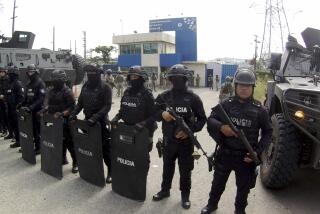U.S. Accuses Panama MPs of Harassing Ambassador : Vows Steps to Protect Americans
- Share via
WASHINGTON — The State Department today accused Panamanian military police of harassing U.S. Ambassador Arthur Davis and said the United States will take all steps necessary to protect Americans in Panama.
The U.S. Embassy in Panama said on Sunday that Davis was pursued for two miles in Panama City by a government military vehicle with its lights flashing and siren blaring. It called the incident serious.
State Department deputy spokeswoman Phyllis Oakley today escalated the Administration’s criticism of Panama over the incident.
“We consider any threat to the safety of the ambassador to be serious as always,” she said today. “We will take the necessary steps to protect Americans. I am condemning the incident from the podium; we regard the action as deliberate harassment.”
Motorcade Refused to Stop
The incident occurred as Davis was returning home after paying an Easter call on the Vatican mission. His motorcade refused to stop. (Story on Page 4.)
Panama’s Foreign Ministry today denied harassing Davis, saying a police sergeant decided to follow the ambassador when he saw an “exaggerated display of automatic arms carried by men in civilian dress in the three cars accompanying . . . Davis.”
The State Department also reacted coolly today to news that Democratic presidential candidate Jesse Jackson has been in contact with Panamanian strongman Manuel A. Noriega and has offered to help ease tensions between the two countries.
“In our view, proliferation of (communications) channels is a tactic that Noriega likes to use to buy time. We have available channels of communication with Noriega if and when they are needed and we think it would be best to continue to use these channels exclusively,” Oakley said in a gentle rebuke to Jackson.
The civil rights leader has made international trips in the past to try to negotiate solutions to complicated crises.
Sees ‘No Direct Role’
Jackson early today told National Public Radio that he would not play a mediating role between the U.S. government and Noriega. “I see no direct role in the relationship myself.”
“My appeal to him was to leave,” Jackson said Sunday in an interview with the Associated Press. Jackson said that in his March 22 letter to Noriega, he offered to do whatever he could “to facilitate his exit” from that country.
In Milwaukee today, Jackson released a letter sent him in return by Noriega in which the strongman rejected “any political and economic program that will be dictated from Washington D.C.”
Jackson said he would forward Noriega’s response to the State Department and Congress.
“I remain convinced that it is in the best interests of the Panamanian people for Gen. Noriega to leave. Today I reiterate my public moral appeal for him to depart,” Jackson said.
Repeated Calls to Quit
The United States has called repeatedly for Noriega to quit as Panama’s de facto ruler and to leave the country.
Noriega, who is under indictment in the United States on drug charges, has shown no sign of capitulating.
The United States is sending 1,300 additional troops to Panama on Tuesday. Troops were loading weapons and supplies into helicopters today in the United States in preparation.
American officials have said the forces are intended to protect U.S. bases and American citizens. Washington has declared that it will not use military force to oust Noriega, whose leadership has been the focus of a national political and economic crisis.
More to Read
Sign up for Essential California
The most important California stories and recommendations in your inbox every morning.
You may occasionally receive promotional content from the Los Angeles Times.













